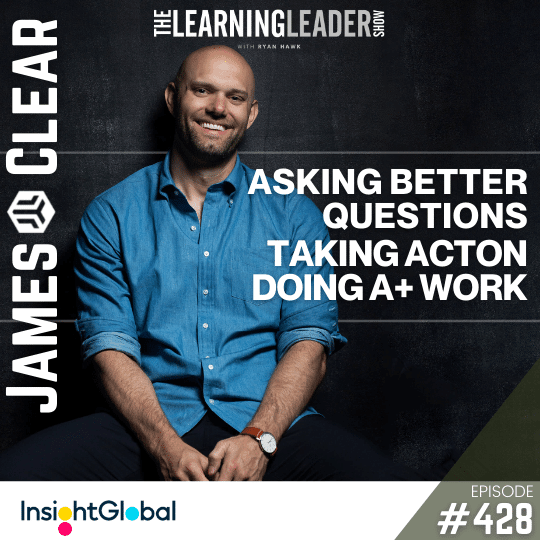James Clear is the author of the #1 New York Times bestseller, Atomic Habits, which has sold more than 4 million copies worldwide. His writing is focused on how we can create better habits, make better decisions, and live better lives. He combines ideas from a wide range of disciplines including biology, neuroscience, psychology, philosophy, and more. His work has appeared in Entrepreneur magazine, Time magazine, the Wall Street Journal, and on CBS This Morning
WATCH this conversation on YouTube. And SUBSCRIBE!
FORBES recently called WELCOME TO MANAGEMENT, “the best leadership book of 2020.”
Be part of “Mindful Monday” — Text LEARNERS to 44222
Subscribe on iTunes or Stitcher Radio
The Learning Leader Show
- “My primary hope is that people find what I write to be useful. As long as someone is able to implement the ideas I share to get the results they want, then I feel like I’ve done my part to make the world a slightly better place.”
- “Working on a problem reduces the fear of it. It’s hard to fear a problem when you are making progress on it—even if progress is imperfect and slow.”
- Action relieves anxiety. We often avoid taking action because we think “I need to learn more,” but the best way to learn is often by taking action.
- Lack of confidence kills more dreams than lack of ability. Talent matters—especially at elite levels—but people talk themselves out of giving their best effort long before talent becomes the limiting factor. You’re capable of more than you know. Don’t be your own bottleneck.
- What looks like talent is often careful preparation. What looks like skill is often persistent revision.
- You need volume before intensity. The bad days are more important than the good days. You need to maintain consistency.
- Preparation for a lawyer:
- Most cases are won long before you enter a courtroom. You must be willing to prepare.
- Question James asks to those who are pitching him a TV show or movie for Atomic Habits:
- What causes a similar show to succeed? (“I don’t think people are serious enough about succeeding.”)
- “Having a plan almost always serves you even if it doesn’t go according to plan.”
- A+ work – Good enough is ok for most things. For creators, doing A+ work is crucial.
- Be “selectively ignorant.” Ignore topics that drain your attention. Unfollow people that drain your energy. Abandon projects that drain your time. Do not keep up with it all. The more selectively ignorant you become, the more broadly knowledgeable you can be.
- At multiple points this year, the top 3 read books on Amazon were: 1) A Promised Land by President Barack Obama 2) Atomic Habits by James Clear, and 3) Becoming by Former first lady, Michelle Obama… I asked James, what is it like to see your work amongst the world’s most powerful people? “It’s been a wild few years!”
- The best marketing strategy? Excellent work
- Read Scott Young’s article, Do The Real Thing
- There are 3 primary drivers of results in life:
- Your luck (randomness).
- Your strategy (choices).
- Your actions (habits).
- Only 2 of the 3 are under your control. But if you master those 2, you can improve the odds that luck will work for you rather than against you.
- A Chilean saying: “Criticizing a musician is easy, but it is more difficult when you have a guitar in your hand.” — Don’t criticize someone else unless you’re willing to do the work.
- Be known as a champion for great ideas versus someone who is against something.
- “The more comfortable I am with myself, the less I feel a need to win arguments with other people.”
- Peer pressure applies when you don’t know who you are.
- Fame – “I have no interest in being famous. I want to be known by brand, not by face.”
- What he learned from a cab driver in Singapore about fame: “They have the name and not the life. We have the life and not the name.”
- The Cardinal Rule of Behavior Change: What gets rewarded, gets repeated. What gets punished, gets avoided. Don’t reward behavior you don’t want to see repeated.
- The easy way is often the hard way. Shortcuts, one-sided deals, and selfish behavior create debts. You only look like a winner until the bill comes due. Short-term actions become long-term frustrations. In hindsight, the hard way only seems slow in the moment.
- “The target audience is always the same: myself. I like Morgan Housel’s line, “Writing for yourself is fun, and it shows. Writing for others is work, and it shows.”
- Life/Career Advice:
- Questions are better than advice… Ask these questions:
- What am I optimizing for?
- Can my current habits carry me to my desired future?
- What am I really trying to achieve?
- What do I really want?
- Go fast – “Don’t rush, but don’t wait.”
- Questions are better than advice… Ask these questions:
- Apply to be part of my Leadership Circle
Resources:
- Read: WELCOME TO MANAGEMENT
- Be part of “Mindful Monday” — Text LEARNERS to 44222
- Read: Atomic Habits
- Connect with me on LinkedIn
- Join our Facebook Group: The Learning Leader Community
- To Follow Me on Twitter: @RyanHawk12
More Learning:
Episode 078: Kat Cole – From Hooters Waitress To President of Cinnabon
Episode 216: Jim Collins — How To Go From Good To Great
Episode #300: AJ & Keith Hawk – How To Instill Work Ethic & Curiosity In Your Children
Episode #303: General Stanley McChrystal – The New Definition Of Leadership


[…] idea to make this an UnKeynote was inspired by an interview with James Clear where he posited that the speakers are the people who learn the most at conferences. So, in an […]